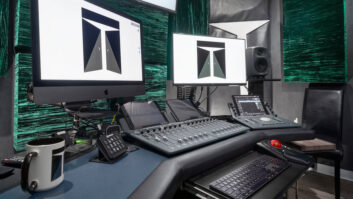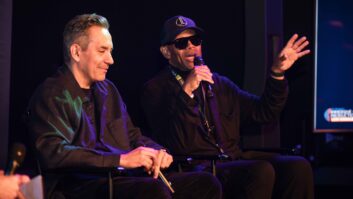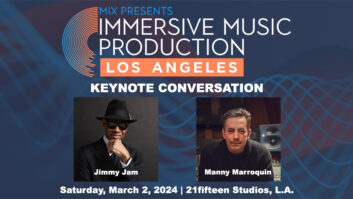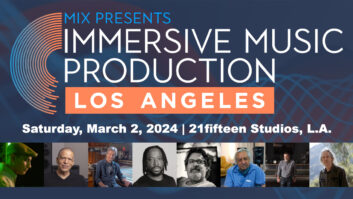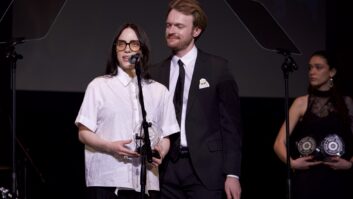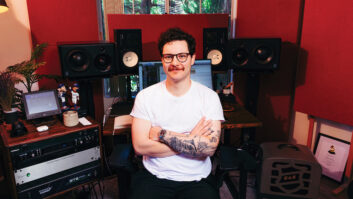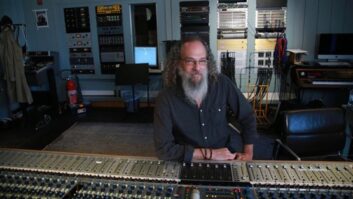A key feature of Pie Studios is the control room’s eight bays of outboard gear, seen here behind owner Perry Margouleff (center) and assistant engineer Wesley Hovanec.

Located about an hour outside of Manhattan in Glen Cove on the North Shore of Long Island, Pie Studios has attracted an impressive list of clients—the Rolling Stones, Jackson Browne, Cheap Trick, The Chieftains—over the years, mainly from outside the New York City area.
“Being outside of Manhattan was actually the biggest minus,” says owner Perry Margouleff of the facility’s location. An earlier attempt at setting up a studio in Stamford, CT with a partner foundered after six months following complaints from neighbors about the noise. “So I was on the hunt for a new location, and I owned all the gear, and decided I was going to do all this on my own and not have partners,” he says.
One potential location was in Manhattan’s then-notorious Alphabet City. “I thought, if I buy a building on the Lower East Side, where there are drug dealers and all this stuff, I’m getting myself into this really tricky situation and it might not work out. The alternative was a studio facility on Long Island that had belonged to somebody else who had passed away, and the widow basically just wanted to dispose of the space. So I had very little up-front expense.”
But potential clients were not attracted to being by the beach, as he had hoped: “They’d say, ‘You mean I have to get in a cab and go above 14th Street?’ So I really never was in the business of doing so much New York-based stuff.”
Margouleff already had a console and tape machines from his previous studio venture. “My thought was that I needed to have a discrete Neve or API desk, but I needed to have enough inputs to mix. In those days it was not uncommon to do a lot of 48-track mixing, so an 8068 with 32 inputs wasn’t going to cut it. I was very fortunate, and was able to buy a really beautiful, fully discrete 8078, which was really my dream console, anyway. It was my belief at the time, and probably still is, that the best choice for tape machine, balancing out functionality and sonic quality, was the [Studer] A800, so I got a pair of those.”
One of Margouleff’s latest album projects, The Royal Sessions by Paul Rodgers, was mixed at Pie but recorded at Royal Studios in Memphis using some of Pie’s gear. “That was primarily because we wanted the vibe and the space,” he explains, “and to not have all the guys who are a bit older have to travel; we wanted to just work in their space.
The sessions were all analog and all live, he says: “People really playing together, no computers, no Auto-tuning, no fixing. The reason that you enjoy that record, besides the familiarity with the songs, is that you’re connecting with the people because they’re actually giving you a performance.”
He has even done a number of albums direct to two-track. “I did a vaudeville, country, swing and ragtime band called the Wiyos that I recorded two albums for, direct to two-track. Unfortunately, their budget didn’t permit them to release it on vinyl. We made the whole record using a Calrec Soundfield mic and an RCA KU3 ribbon, and did the mixing by moving people around until we got the right balances. That’s another one of those records that people listen to and feel like, ‘Wow! I’m in the room with musicians playing.’ When you listen to it back off of the one-inch two-track tapes, it’s sort of mind-boggling.”
It was quite a while before Margouleff purchased a Pro Tools rig. “I always stuck with analog, because I really prefer the sound, which we all know is better. But there came a much greater realization in the last five to six years that analog recording provides a tremendous talent filter. If you can’t play, and you can’t sing, I can’t work with you, because I can’t fix it. It spares me the grief of being up at 4:00 in the morning piecing together a vocal. So I really pick and choose; I’m super discerning about the people I get involved with and work with. Plus, I wouldn’t be doing anybody a service: they’d get a better job—if that’s what they want—going somewhere else with somebody who can do all that stuff.”
In recent years he has observed younger artists, especially, recording one chorus, for example, then copying and pasting it where it repeats. “But I have to tell you, I think there’s been a tremendous renaissance where young musicians are really studying the craft again of being musicians, and are very proud of playing. They come in and are really prepared to play, and would be very insulted if you said to them, that’s good enough, I’ll just cut and paste. They would have a cow! And I’m thrilled—that’s the way it should be, of course.”
Margouleff played The Royal Sessions for a record label executive: “[He’s] on the 30th floor with the $2 million office, the $150,000 stereo, and he’s super nice to me. He takes Paul Rodgers’ CD and puts it in his stereo, and he puts his feet up on his desk and closes his eyes for 40 minutes. He does not open his eyes, he does not go verse-chorus-click, onto the next song—he sits there and he listens to the whole record. And he says, ‘This is the best-sounding record I’ve heard in years; this is unbelievable.’
“But, he says, ‘Nobody will buy it, because Paul’s 64 years old. People don’t listen to conventional music anymore, with real arrangements.’ And I thought to myself, this is insane; I didn’t want to argue with him, but I was thinking, how did Adele sell 27 million records of songs with real arrangements?”
Margouleff continues, “And then he says to me, ‘Why are you working with old guys? You should be working with 20-year-olds, with your talent. You should be developing new artists.’ I said, I would be very happy to work with new, young artists—and I do—but I’m also not prejudiced. No one ever told Louis Armstrong that he was too old to make good music.
“I think that we have a responsibility—if we have the skill sets and the connections and everything—to do a good job at what we know to be good music, to do the best we possibly can. I had a band called The Library is on Fire, they’re from Ohio, but they live in Williamsburg. They had no money at all. They did part of their record out in Ohio with a guy named Todd Tobias, who produced Guided by Voices, and they wanted to do the rest of their record. I brought them in and cut half of it and mixed the whole record for $1,500, because these guys have really got it and they deserved the help. We did it in a week, and it was a total thrill to work with them. We need to support music for the right reasons, and then I think it can flourish. People still love music, they need music—that’s my motivation.”
